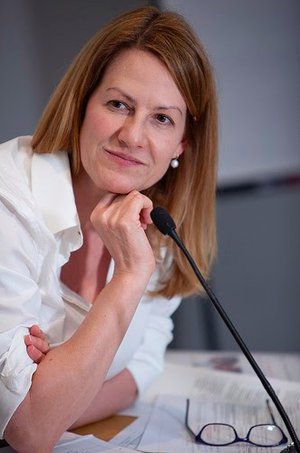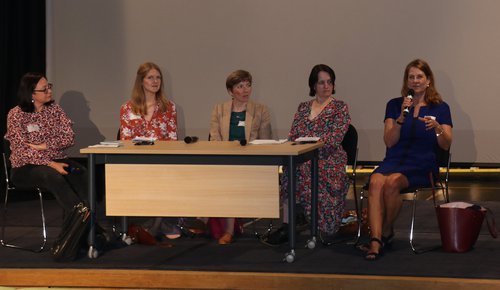Transitioning to Leadership: event summary
 In the 40 years of women at St John's, we have contributed female talent to a respectable number of high profile boards in the UK and beyond. Three of our alumni, with significant experience, agreed to share their experience and lessons learned on their paths to leadership: Gillian Baxendine (1983) started her career in the UK civil service and became Secretary to the Leader of the House of Commons. She joined the Scottish Parliament from its inception and is currently Head of its Participation and Communities Team, leading efforts to amplify the voices of often-marginalised groups in policy and legislation. Isobel Pinder (1980) has a wealth of experience in coaching BoDs and serves as a board member and trustee of the Cathedral Music Trust, and is Chair and Director of the CPF Trust, a small grant-giving charity. Our third panel member was Lizzie Locket (1989) who is Chief Executive Officer (CEO) of the Royal College of Veterinary Surgeons. As the panel moderator, I brought insights from more than 10 years serving on the boards of international NGOs such as the Calcutta Project and more recently as a director of the Swiss Centre for Design and Health, a public-private initiative of the Hochschule der Künste (University of the Arts), Bern.
In the 40 years of women at St John's, we have contributed female talent to a respectable number of high profile boards in the UK and beyond. Three of our alumni, with significant experience, agreed to share their experience and lessons learned on their paths to leadership: Gillian Baxendine (1983) started her career in the UK civil service and became Secretary to the Leader of the House of Commons. She joined the Scottish Parliament from its inception and is currently Head of its Participation and Communities Team, leading efforts to amplify the voices of often-marginalised groups in policy and legislation. Isobel Pinder (1980) has a wealth of experience in coaching BoDs and serves as a board member and trustee of the Cathedral Music Trust, and is Chair and Director of the CPF Trust, a small grant-giving charity. Our third panel member was Lizzie Locket (1989) who is Chief Executive Officer (CEO) of the Royal College of Veterinary Surgeons. As the panel moderator, I brought insights from more than 10 years serving on the boards of international NGOs such as the Calcutta Project and more recently as a director of the Swiss Centre for Design and Health, a public-private initiative of the Hochschule der Künste (University of the Arts), Bern.
The theme for this particular discussion arose from reflections upon the data regarding the gender compositions of BoDs. Although data tend to be confined to public companies whose information is more publicly available, diverse studies indicate women to be under-represented on corporate boards and that change in this trend is slow. According to Deloitte's most recent analysis, women hold only 16.9% of board seats worldwide and only 5.3% of chair positions. Norway leads the field with the highest representation of women at 41%, but other countries such as Japan, South Korea and Qatar have only 5.2%, 2.4%, and 0.6% respectively. Given the evidence that companies with a strong female leadership profile have healthier cultures and generate a Return on Equity of 10.1% per year, versus 7.4% for those without, this begs the questions that we intended to explore, such as: "What is obstructing women from occupying board seats?! and, more practically, for St John's women: "How to negotiate the path to a board seat?"
We began by discussing why there are fewer women than men in leadership and on BoDs and what is holding women back. From the outset, the informal, roundtable format we adopted generated lively discussion. We identified an array of cultural, social and biological factors such as childbearing, caring and leadership on the domestic front that hamper women's path to professional leadership, but also many participants voiced the concern that women suffer disproportionately from "imposter syndrome". Interestingly, later in the plenary discussion, we learned that this issue had been raised in most of the different panel discussions in the course of the day's event.
 To support women interested in transitioning to leadership positions, we unpacked our own routes onto board membership. It emerged that we all had diverse routes to serving on boards and very different experiences of external enabling factors. Some of us occupied board positions that we had applied for and others had been invited to join; some of us had benefitted from positive mentoring, active confidence building and shepherding into leadership by influential supervisors, whereas others had not received support from a mentor or senior in the workplace.
To support women interested in transitioning to leadership positions, we unpacked our own routes onto board membership. It emerged that we all had diverse routes to serving on boards and very different experiences of external enabling factors. Some of us occupied board positions that we had applied for and others had been invited to join; some of us had benefitted from positive mentoring, active confidence building and shepherding into leadership by influential supervisors, whereas others had not received support from a mentor or senior in the workplace.
One common factor that emerged from the discussion was that we were all directing institutions that were engaged in issues and themes that we cared about passionately and in which we had previously been active and vociferous. The takeaway is that regardless of whether or not you are fortunate to have external support in your leadership ambitions, active engagement in the issues you care about will provide momentum and visibility to position and support you to transition to leadership.
The rich participatory discussion and broad sharing of motivation and experience, concerns and hopes brought into sharp focus the role of female solidarity and support in addressing the gender disparity in institutional leadership. Since the St John's Women's Network has been established, we have a platform to harness and share our experiences to support each other in overcoming gendered obstacles to our ambitions and to enable the world to benefit from a stronger representation of female insights, qualities and talents in governance.
I look forward to seeing you at the next St John's Women's Network event and exploring how we can support each other to tackle gender barriers and transition to leadership to strengthen positive female contributions to the governance of business, industry and the public sector.
Check for updates on the Women's Network Facebook Page